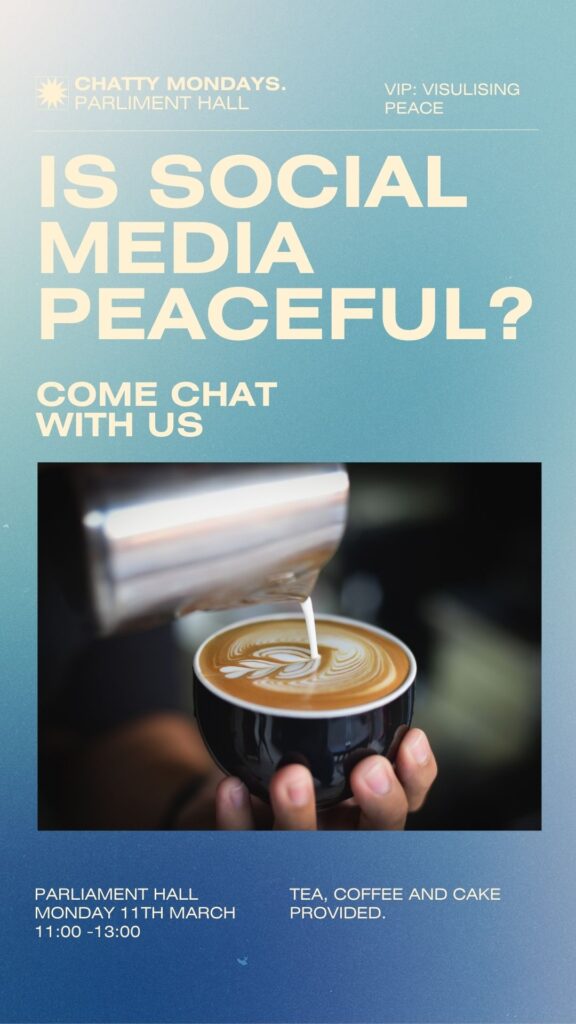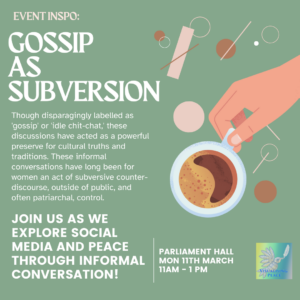


The Visualising Peace team has been exploring the relationship between responsible debate and peacebuilding. As part of this a group of students – Tao Yazaki, Zoe Gudino, Finlay Whitton, Anna Pilgrim, Jazmin Smallridge, and Tabitha Stuart – have been running a series of debates using different formats, from competitive to collaborative approaches. We had two aims in doing this: we wanted to give participants the opportunity to discuss the use of social media for peacebuilding in a range of contexts, and we also wanted to examine the dynamics of different models of debate, mindful of their potential for driving conflict as well as promoting dialogue. In debating the role of social media (itself a platform for debate), we hoped to get more people thinking about connections between how we discuss contentious issues and how we visualise and build peace in the wider world.

One approach to debating which we decided to experiment with was based around ‘chat’, partly inspired by Fleabag’s Chatty Wednesdays and partly by research into marginalised forms of debate and knowledge exchange, in particular the denigration and exclusion of women’s voices as ‘mere gossip’. We invited ‘town and gown’ to come together, drink tea and coffee, eat cake, and chat or gossip about the challenges and opportunities for peacebuilding posed by social media. There was no formal structure – people dropped in and out of the two-hour session – but we placed optional discussion prompts on the tables which participants could refer to if they wanted during their chat. (You can see a sample in the document below, and below that some reflections on ‘gossip’ as a mode of knowledge production and exchange.)
Conversation flowed in organic, responsive ways, as participants listened to each other, shared very different kinds of expertise (from scientific findings to lived experience), exchanged perspectives, reflected on other people’s points, built on what others had said, floated alternative possibilities, posed new questions, and moved between tables. The intimate informality of chatting in small groups over tea and coffee allowed for thought experiments and musing, rather than persuasive argumentation – and was more inclusive of different kinds of knowledge and expertise than more formal debating practices tend to be. The range of people around any given table (some who had met before, others meeting for the first time) brought diverse perspectives, information, understandings and experiences to the conversation. The lack of visible hierarchies or power imbalances and the equal involvement of everyone present gave discussions a collaborative feel. And the absence of an audience to ‘win over’ and the open-ended nature of the conversation (with no set goal or vote to aim for) allowed participants to follow the discussion where it took them, rather than specific agenda shaping the direction of debate.
Those who attended thought hard, revised prior viewpoints, gained fresh insights, and learnt a lot from this ‘gossip’, proving that accessible, slow, organic, unstructured conversation (containing multiple kinds of expertise) can be just as effective a way of debating important topics like social media and peacebuilding as more traditional (and often competitive) models of political debate. Participants not only felt that they had the chance to explore the opportunities and challenges of social media use in peacebuilding in real depth; they also made progress identifying solutions to potential pitfalls as a team, rather having to ‘pick a side’ or come to a yes-no answer on whether social media is a blessing or a curse. We recommend this approach for more ‘responsible debate’ on important topics like conflict and peacebuilding!
